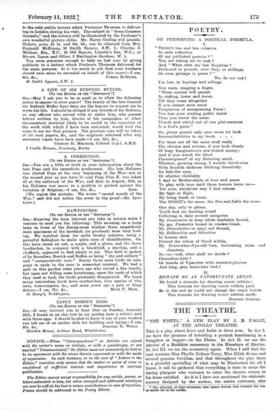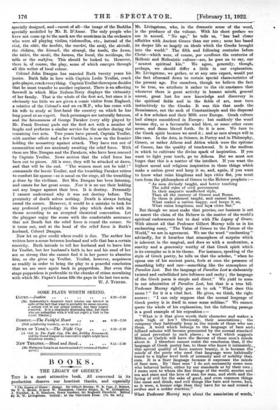THE THEATRE.
"TILE WHEEL," A NEW PLAY BY J. B. FAGAX, AT Ttl.E APOLLO THEATRE.
THIS is a play about Love and India in three acts. In Act I. we have the pleasure of beholding a punkah functioning in a bungalow at Jagpur—in the Plains. In Act IL we see the interior of a Buddhist monastery in the Himalaya of Bhutan. In Act Ill we see the monastery again. When I add that the cast contains Mils Phyllis Neilson-Terry, Miss Edith Evans and several genuine Gurkhas, and that throughout the play there is a plentiful sprinkling of what may be Hindustani for all 1 know, it will be. gathered that everything is done to make the daring playgoer who ventures to enter the theatre return to his home satisfied. As it. is I have not mentioned the elaborate scenery designed by the author, the native costumes, also • The principle of light-attraction that makes downs turn towards the run. or moths die in the candle. specially designed, and—rarest of all—the image of the Buddha specially modelled by Mr. R. D'Amar. The only people who have not come up to the mark are the musicians in the orchestra who were all playing violins, violoncellos, etc., instead of the rind, the sitdr, the tambilr, the maniri, the arid, the seirindA, the chikdra, the kinnari, the sarangi, the tombi, the kuma, the tatiiri, the sandi, the karana, the kural, the mridanga, the tabia or the makira. This should be looked to. However, there is, of course; the play, some of which emerges through all this welter of local colour.
Colonel John Dangan has married Ruth twenty years his junior. Ruth falls in love with Captain Leslie Yeullat, crack polo-player, crack everything. Captain Yeullat thereupon decides that he must transfer to another regiment. There is an affecting farewell in which Miss Neilson-Terry displays the virtuosity of her family. That is the whole of the first act, but since it is obviously too little we are given a comic visitor from England, a relative of the Colonel's and an ex-M.P., who has come with his wife to study at -first-hand the country on which he has long posed as an expert. Such personages are naturally fatuous, and the fatuousness of George Faraker (very ably played by Mr. Frank Denton) pads Out the first act with a number of laughs and performs a similar service for the author during the remaining two acts. Two years have passed, Captain Yeullat, with another officer And a few Gurkhas, is now on the frontier holding the monastery against attack. They have run out of ammunition and are anxiously awaiting the relief force. With them are Mrs. 'Dangan and the Farakers, who have been rescued by Captain Yeullat. News arrives that the relief force has been cut to pieces. All is over, they will be attacked at dawn, and that will be the end. "The women must not be told I " commands the heroic Yeullat, and the trembling Faraker retires to comfort his spouse—as is usual on the stage, all the trembling is done by the civilians. But Mrs. Dangan has been listening, and enters for her, great scene. Now it is no use their holding out any longer against their love, it is destiny. Personally I cannot understand why it was not destiny before. The proximity of death solves nothing. Death is always lurking round the corner. However, it would be a mistake to look for any profound psychology in this play which deals with its theme according to an aCcepted theatrical convention. Let the playgoer enjoy the scene with the comfortable assurance that not Death but the relief force is round the corner. So it turns out, • and at the head of the relief force is Ruth's husband, Colonel Dangan.
Now let us give credit where credit is due. The author has written here a scene between husband and wife that has a certain sincerity. Ruth intends to tell her husband and to leave him for Yeullat, but her husband's faith in her and his need of her are so strong that she cannot find it in her power to abandon him, so she gives up Yeullat. Yeullat, however, acquiesces so readily in order to bring the play to a peaceful conclusion that we are once again back in puppetdom.. But even this stage puppetdom is preferable to the chunks of otiose moralizing with which Mr. Pagan's Lama fills the gaps in the last two acts.
W. J. TURNER.



































 Previous page
Previous page